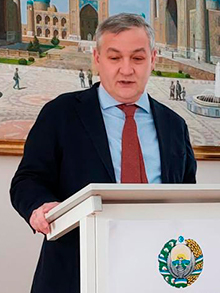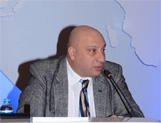The main directions of the state policy of Uzbekistan in the context of improving the country's position in international rankings and indices  Tokhir Khasanov, Academy of Public Administration under the President of the Republic of Uzbekistan, DSc. in Economics, Associate Professor Tokhir Khasanov, Academy of Public Administration under the President of the Republic of Uzbekistan, DSc. in Economics, Associate Professor
Uzbekistan, nestled in the heart of Central Asia, has historically been a melting pot of cultures and civilizations, thanks to its pivotal role in the Silk Road. Its rich tapestry of history reflects a blend of empires, nomads, and diverse cultures that have left their mark over millennia.
READ MORE
- Tuesday, 28 November 2023, 07:45
The efficiency of organization of measures to ensure public safety based on the principle of “Serving human interests”  Umidjon Qodirov,
Independent researcher of the Academy of the MIA of the Republic of Uzbekistan, cand.of law sciences, associate professor Umidjon Qodirov,
Independent researcher of the Academy of the MIA of the Republic of Uzbekistan, cand.of law sciences, associate professor
Special attention is being paid to ensuring a peaceful and tranquil life of the population and to forming a culture of law-abidingness and public safety as part of the large-scale reforms implemented in our country. In particular, completely new mechanisms and procedures for organizing work in the direction of public safety on the basis of the principle of “Serving the interests of the people” are introduced, and mutual purposeful cooperation of state bodies with public structures is established.
READ MORE
- Tuesday, 28 November 2023, 07:25
Uzbekistan’s April 30 Constitutional Referendum Is Set To Deliver Results  By Ambassador Dilyor KHAKIMOV, Ambassador of the Republic of Uzbekistan in Belgium By Ambassador Dilyor KHAKIMOV, Ambassador of the Republic of Uzbekistan in Belgium
Over the past year, under the leadership of President Shavkat Mirziyoyev, Uzbekistan has embarked upon a national dialogue. Input, feedback, and affirmations from tens of thousands of Uzbek citizens have guided the drafting of a revised Constitution. In recent days, a flurry of activity has occurred that may soon make this draft official and usher in a fresh era for our country as we build a “New Uzbekistan.” Last week, the draft Constitution was considered in the Legislative Chamber and was approved for submission to a referendum on April 30. Then, on Monday, March 13, the Constitutional Court of Uzbekistan ruled that the decision by the Legislative Chamber to hold a referendum was in constitutional compliance. Finally, the Senate, just yesterday, March 14, confirmed this decision and approved the draft for submission to a constitutional referendum that will take place on April 30. READ MORE.
- Wednesday, 15 March 2023, 14:32
The Russian-Turkish “Co-opetition” in Eurasia and Beyond  By Yeghia TASHJIAN, Beirut-based regional analyst and researcher, columnist, "The Armenian Weekly” By Yeghia TASHJIAN, Beirut-based regional analyst and researcher, columnist, "The Armenian Weekly”
“Co-opetition” was a term coined by Adam M. Brandenburger and Barry Nalebuff to describe a paradoxical strategy of cooperation among competitors, enabling them to collectively achieve mutual gains. It’s a relatively new term in international relations and used occasionally in international trade. Nevertheless, I will be using co-opetition to explain the current status of Russian-Turkish relations.
In foreign policymaking and geopolitical self-perception, Russia and Turkey resemble each other in many ways. Throughout the course of events in the Middle East and South Caucasus, as the West failed to engage with regional developments to resolve conflicts, other regional states such as Iran, Turkey and Russia filled the political vacuum. Hence, the Turkish-Russian interaction in the Middle East and beyond has been partially facilitated by the military and political withdrawal of the US and the European Union’s absence from the region. READ MORE
- Wednesday, 15 December 2021, 09:23
Nuclear Energy for Uzbekistan: Achieving Decarbonization Targets and Resolving Energy Shortages  Embassy of the Republic of Uzbekistan in the Kingdom of Belgium Embassy of the Republic of Uzbekistan in the Kingdom of Belgium
On 29 January 2021 the Brussels-based media outlet EU Today and the Brussels Press Club in Brussels hosted a conference dedicated to the construction of nuclear power plants in Belarus, Turkey and Uzbekistan. Despite the fact that plans for the construction of new power units are being considered at various stages both in the EU member states-Finland, Hungary, the Czech Republic, Bulgaria, and in the UK, Pakistan, the United Arab Emirates, etc., the discussion was focused on these countries. Much attention at the conference was paid to the construction of nuclear power plants in Uzbekistan.
READ MORE
- Wednesday, 7 April 2021, 22:28
Political Crisis in Georgia after the Parliamentary Elections  By Nika Chitadze, PhD, Professor at the International University of the Black Sea, Tbilisi By Nika Chitadze, PhD, Professor at the International University of the Black Sea, Tbilisi
As it is well known from recent media reports, a new political crisis has emerged in Georgia after the October 31, 2020 parliamentary elections. The main reason for this crisis is the fact that the opposition parties have claimed that the Central Election Commission and the ruling party “Georgian Dream” have falsified the election results and have usurped the power. The National Democratic Institute and the American Republican Institute have expressed their critical views in this regard. A relatively soft position was stated by the OSCE Office for Democracy and Human Rights and the Council of Europe.
READ MORE
- Thursday, 7 January 2021, 06:15
Status Report: The Ukrainian Navy By Eugene Kogan, Tbilisi-based defence and security expert
Undoubtedly, the Russian annexation of Crimea in March 2014 caused serious damage to the Ukrainian Naval Forces. About 70 per cent of the fleet has been lost and what remained is in poor shape and in need of repairs.
The resulting conflict in the Eastern part of Ukraine drew attention, energy and resources away from the difficult state of the Ukrainian Navy towards the urgent needs of the army and air force. The perilous state of the economy has further decreased financial support for the Navy’s needs. In addition, a debate on the conceptual vision of the Navy divided the expert community and top naval personnel for about 15 months. READ MORE
- Wednesday, 6 January 2021, 05:46
Non-alignment Policy as a Principle of Shaping the National Security of Azerbaijan  By professor Sadi Sadiyev Saleh, War College of the Armed Forces, Republic of Azerbaijan By professor Sadi Sadiyev Saleh, War College of the Armed Forces, Republic of Azerbaijan
The emergence of a bipolar world and the formation of two military blocks (NATO and the Warsaw Pact) after the Second World War ushered in an intense rivalry between different countries. Finding an effective grand strategy to survive between two hostile powers inevitably requires a balanced policy. In this context, the underdeveloped countries felt the need to join efforts for the common defence of their interests, to strengthen their independence and sovereignty and to express a strong commitment for peace by declaring themselves as “non-aligned” from either of the two nascent military blocks. READ MORE
- Thursday, 14 February 2019, 20:25
|
|